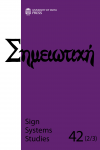The role of trust in binding the perspectives of guide dogs and their visually impaired handlers
The role of trust in binding the perspectives of guide dogs and their visually impaired handlers
Author(s): Riin MagnusSubject(s): Semiotics / Semiology, Sociobiology
Published by: Tartu Ülikooli Kirjastus
Keywords: perspectivism; zoosemiotics; guide dogs; trust; interspecific communication;
Summary/Abstract: Building on anthropological discussions of perspectivism and (zoo)semiotic accounts of sign use by humans and other animals, the article explores the cooperation of a guide dog and its visually impaired handler as contingent on the mutual adjustment of two individual perspectives. A perspective is defined as a point of view which comprises the meanings as well as the forms of objects that the subject perceives and acts upon. On certain occasions, individual perspectives can be alligated to one another, resulting in a transformation of the meaningful worlds of the subjects. Three types of connections between individual perspectives are delineated in the paper, resulting in the formation of mimetic, collaborative and comparative double perspectives. Although all of them bear relevance for the guide dog team’s interactions, the collaborative double perspective is put under further scrutiny. The maintenance of the collaborative double perspective depends on the formation of trust between the two individuals. While investigating the conditions for the establishment of trust, a question is raised as to whether a shared communication system can serve as an ultimate ground for it.
Journal: Σημειωτκή - Sign Systems Studies
- Issue Year: 42/2014
- Issue No: 2-3
- Page Range: 376-398
- Page Count: 23
- Language: English

